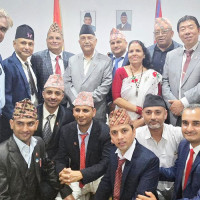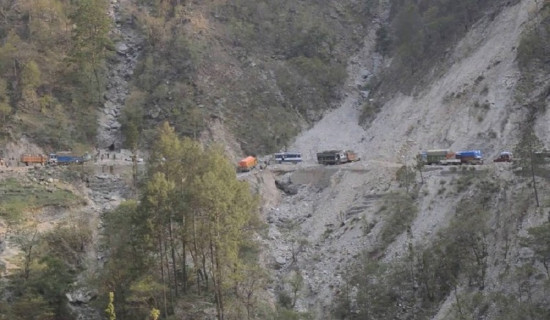- Friday, 4 July 2025
Crackdown continues on street vendors sans long-term solution
By Nayak Paudel & Sushma Maharjan
Kathmandu, Oct. 23: Ramesh Ray, a man in his mid-30s, was selling clothes at the footpath in front of Nepal Airlines Corporation Office Saturday afternoon. Leaning to the corporation’s surrounding wall, Ray grabbed a big polythene bag from which he was selling the clothes with his legs.
“If I start selling clothes by placing a tarpaulin on the footpath, I won’t be able to flee with my items when the city police arrive. This is why I carry few clothes in a big polythene bag. With it, I can earn some money to support my family and won’t get caught by the police,” Ray said.
According to Ray, he used to sell many more clothes by placing a tarpaulin on the same footpath until some months ago in the evenings.
This year’s month-long festivals of Dashain, Tihar and Chhath will end at the end of October. During this time of the year, the footpaths across Kathmandu would have been filled with street vendors like Ray selling almost every types of goods. However, the footpaths are now almost free from vendors.
Stern action against the street vendors by the Kathmandu Metropolitan City (KMC) in the past few months have caused the change.
On Saturday afternoon, there were more than half-a-dozen other vendors in front of the corporation office selling different goods. The common thing among them was they were standing with a polythene bag or a cartoon box of goods so that they could escape as soon as the city police arrived.
“If the city police are able to confiscate our items, they are auctioned. We don’t get them back. It causes great economic loss and the burden towards my family increases,” said Ray.
Blind individuals who sing along the streets across Kathmandu to earn some money for their livelihood were also forced to stop doing so by the KMC. It wasn’t the first time either.
The victims have been protesting against the move. They had reached in front of the KMC office on Friday demanding justice. According to the victims, they had no other options of earning than to busk along the roads.
What does KMC say?
Raju Pandey, KMC City Police chief, said that they had no other option than to confiscate those goods since the metropolis has time and again notified to remove all the businesses operating in the public places of the city.
"Our requests continued to fall in deaf ears leading us to seize the goods. The metropolis is determined to make the city clean and livable and will continue the removal of such businesses," said Pandey. According to KMC spokesperson Nabin Manandhar, the confiscated goods are stored on the premises of District Police Range, Kathmandu.
“The seized goods will not be returned to the vendors. The metropolis will release the goods through an auction.
The vendors can participate in the auction to get their goods back,” said Manandhar.
Manandhar informed that the metropolis had collected Rs. 84,000 by auctioning the goods confiscated from the footpath since August 22. KMC Mayor Balendra Shah, while publishing his 100-day achievements, had said that the footpath is solely for pedestrians and should not be encroached in the name of business and other reasons.
"Footpaths and streets should remain unexploited for proper management of the city. The local government did what was necessary to make our city clean,” Shah said.
Since Shah became the mayor, the KMC has inspected the city overall. The removal of street vendors and encroached structures have been reported from New Baneshwor, Tinkune, Koteshwor, Chabahil, Boudha, Durbar Marg, Ason, New Road, Chettrapati, Kalanki, Swoyambhu, Banasthali and other places.
According to the KMC officials, they are focusing on keeping streets and footpaths free from any forms of encroachment including street vendors and have not decided on any long-term solution for the issue yet.
Being the capital city, the central government has also been involved in the issue multiple times over the years.
More than a decade ago, a government committee had suggested to provide areas in Khulamanch, Tinkune, Kalanki and Balaju for the street vendors. It was never implemented.
Around eight years ago, then Minister for Home Affairs Bam Dev Gautam had ordered to make the city streets free of street vendors. It had resulted in intense protests by the vendors.
Even a month ago, around 5,000 street vendors marched through the capital city demanding proper relocation and management. However, nothing has been done yet and the KMC has no further plans until now.
What do street vendors say?
A group of around half-a-dozen women were hiding in the alley near the Juddha Barun Yantra Office in New Road Saturday afternoon. According to the women, it is their hiding place whenever they see the truck of the KMC City Police arrive at Dharma Path, Kathmandu.
In a bid to escape easily, they too carry their goods in big polythene bags.
“We know that the KMC has restricted businesses in the footpaths. However, it is the best we can do to earn some money for our families to survive. We don’t have enough capital to begin a proper business, or else, we too want to have our own shop in a proper building,” the women echoed.
As per the women, the step of KMC has greatly affected them since it was a festival season.
According to Nepal Union of Street Traders (NEST), an organisation of street vendors, there are around 50,000 street vendors in the Kathmandu Valley who earn to support around 200,000 family members.
“The street vendors are in the street with minimum goods to sell because they cannot afford large shops. Almost all the vendors have chosen this business due to poverty. People pay their children’s school fees, house rent and afford two-meal a day by selling goods in the streets,” said Maya Gurung, chairperson of NEST.
Gurung stressed that thousands of street vendors have been greatly affected economically due to strict restriction on operating and forceful confiscation of their goods.
“Many had even sought loan through different means to afford more goods for selling during the month-long festival season. However, those goods are gathering dust in different warehouses in the city,” said Gurung.
The union had given the KMC a month’s ultimatum, which ends on October 26, to address their seven-point demands. Gurung informed that they have not been called even to a round-table discussion. “Neither have we been able to speak about our problems to the KMC nor has the KMC ever expressed their views directly to us. We have been able to learn about the city’s steps against street vendors only through the media,” she added.
The union has demanded to return the seized goods of the vendors, devise necessary plans and policies for the vendors, establish ‘Citizen Shop’ where they can sell goods at cheaper price and form an all-party committee to find a long-term solution, among others.
“The KMC has no plan to address our concerns, so we will be bound to stage protests after the festival of Chhath. We have no other choice,” said Gurung.
Gurung stressed that the union was a part of Street International, an international alliance of street vendors based in Durban, South Africa. “We are in contact with our international community. In many countries, the street vendors have been allowed to operate with ease under certain regulations. We expect that our government could do the same,” Gurung said.















